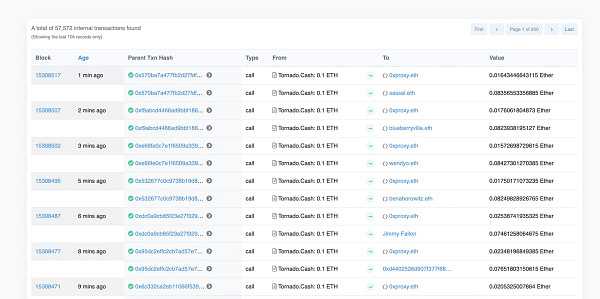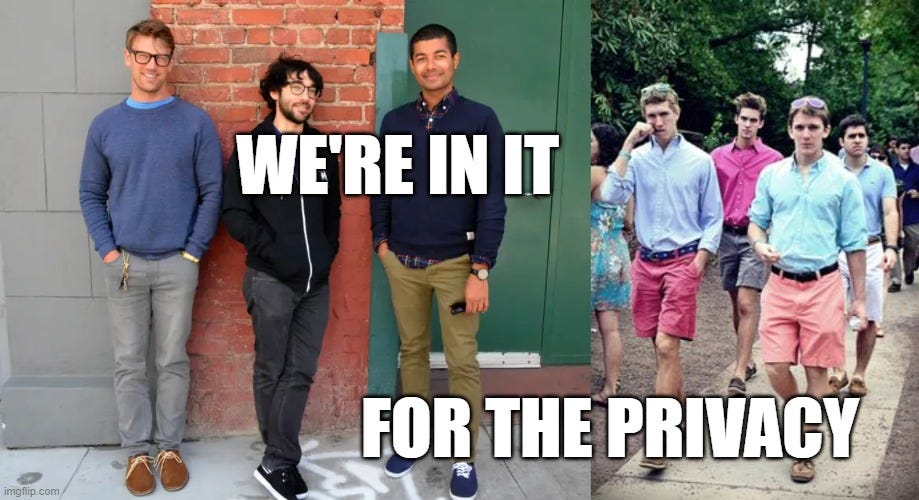
Disclaimer, NFA, all that legal stuff: All the information presented on this publication and its affiliates is strictly for educational purposes only. It should not be construed or taken as financial, legal, investment, or any other form of advice.
Hi folks,
I am once again a bit late with today’s issue. Apologies. But really, crypto is moving so fast that I often find myself changing the topic that I want to write about at the last minute. I could’ve written about on-chain indexes or the Ethereum PoW fork shenanigans but then the US Treasury decided to add some spices to the already rich dish called the crypto bear market by sanctioning a piece of open-source code. I have a lot of thoughts on this, so let’s get to it.
Living in a Decentralized World
On August 8, 2022, the US Treasury sanctions the “Virtual Currency Mixer Tornado Cash”, which it claims to have been utilized to launder $7 billion+ worth of crypto assets since its inception in 2019. Unsurprisingly, the second-order effect of this decision to add a piece of autonomous open-source code, instead of a person or an entity, to the OFAC list for the first time is far-reaching. While previously crypto wallet addresses have been added to the list, it was always geared towards wallet(s) that belong to a specific individual or entity instead of a service or a smart contract.
This action changes the game.

Crypto people are riled up, with many voicing that this is a wake-up call for the industry to understand the true ethos of cryptocurrency amidst the ongoing wave of web 3.0 mania that focuses on the tech and start-up aspect instead of the original cypherpunk ideology that advocates for strong cryptography and privacy technologies as a means to social and political change.
Additionally, this action by the US Treasury also means that the USDC addresses listed on the OFAC list need to be frozen by its issuer, Circle, otherwise the company and its executives might face 30 years in prison.

So what comes next? — the conversation right now screams that this is another wake-up call for the crypto space to decentralize everything. The full stack. We can’t have a centralized stablecoin issuer, a centralized RPC provider, and a centralized code repository. Yes, unsurprisingly Infura, Alchemy, and GitHub (owned by Microsoft), all block access to Tornado Cash. In reality, there are ways for tech-savvy people to still interact with Tornado since these entities can only block the front-end, but this still removes access for the majority of people out there. Oh, and the code is literally stored for 1,000 years in an arctic vault in Norway. Pretty cool.



To make matters even more complicated in an environment where even your top attorneys are not entirely sure what to do, somebody out there is sending 0.1 ETH to a bunch of Ethereum wallets from a Tornado-linked address, essentially “dirtying” these wallets and “greying” out the capital inside these wallets for US-associated persons and entities (and the world tbh). EU citizens are not impacted by this sanction, but everybody *usually* eventually follows Uncle Sam when it’s about Benjamins.


Here are the quick takeaways:
A truly decentralized stablecoin is more important than ever.
For crypto to be fully censorship-resistant, the entire blockchain and crypto market infrastructure needs to be decentralized.
HOT TAKE: if the technology is not good enough for crypto to be fully censorship-resistant, then perhaps all of this is only going to enhance the efficiency of global capital markets, and that’s okay.
The crypto space will diverge based on ideologies to (i) privacy-decentralized maximalist and (ii) web 3.0 via tokens.
In a scenario of ideological divergence, the outcome usually lies in the middle.
A Different Crowd
The “privacy” aspect of crypto has generally been left out in the past few years. I remember the Coinmarketcap top 50 tokens list in 2017. DASH, XMR, and a few others were considered top coins and market participants were championing privacy as one of the core features of this nascent asset class. Fast forward to 2022, whether you like it or not, the excitement around crypto is now driven by the web 3.0 culture championed by VC firms as it enables a *potentially* new way to build software, construct organizations, deploy business models, and disrupt the big tech incumbents that are getting lazy (okay maybe not big tech, just big social media, I mean just Meta).
The talents that flocked into crypto from big tech and big finance in the past few years were not inspired because they want to obfuscate the trace of their transactions, these people literally grew up in Palo Alto or Old Greenwich and make 6 figures as fresh graduates. Do you think they care about privacy?
As much as it sucks to hear, we must admit that privacy is not at the forefront of most people’s minds, at least not to the extent of what cypherpunks or decentralization maxi aims for. Apple preaches privacy — is that good enough? For most people, the answer is probably yes.
That said, the US Treasury is also addressing the wrong crowd. Chainalysis data shows that less than 11% of the capital pooled in Tornado Cash came from exploits. This is akin to sanctioning HSBC or some other banks because they’ve accidentally (allegedly) laundered money from drug cartels and criminals. In fact, approximately $300 billion is laundered through the US annually and in 2020 alone global banks had to pay $10.4 billion in fines for money-laundering violations. A classic case of governments going for the lowest hanging fruit that they can boast about without actually enacting meaningful change to prevent money laundering.
Benevolent Dictator
Frankly, I don’t know what’s right. When I saw the sanction, the first thing that came to my mind was that it is so glaringly obvious that something along this line will happen — maybe it’s because I work a lot closer with legacy financial institutions in my day job, which made me saw this from miles away. At the same time, I empathize with the crowds that got riled up by this action. I was never really a cypherpunk myself, but I can understand where they’re coming from.
People in tech and crypto often glorified libertarianism and are generally more anti-government. I have mixed feelings about this. My privilege of growing up in a Non-Aligned Movement country and then as a third-culture kid exposed me to multiple cultures, different socioeconomic backgrounds, and various governmental structures. There are too many investors turned podcasters who are preaching the government's bad playbook these days without understanding how different parts of the world works. The reality is often much more complex and lies in the middle.
I believe that if your basic needs are met and you live at least a somewhat prosperous life, you’re much less likely to riot. China increases its level of common prosperity significantly in the past few decades, which is why its citizens don’t mind the government control. Hong Kong is an extremely expensive city where 20-30 y.o. persons are living paycheck-to-paycheck in a 40-square foot (3.7 square meters), which is why rioted. You don’t like the Chinese example? Let’s use Scandinavia as the barometer then. Anyway, I’ve digressed enough.
The point is that the overly anti-government sentiment that is prevalent in crypto is not helping nor realistic. Some government controls will happen, but expecting a totally dystopian future whereby big governments control everything that you touch is most likely the aftereffect of being “too online” or consuming too much Alex Jones. Go out and touch some grass.
If all things go down the drain *knock on wood* and the majority of crypto transactions will require some sort of identification whereby governments control all the chokepoints, and digital asset use-cases are only to increase the efficiency of global capital markets, then that’s fine. If the technology is not good enough to be fully censorship-resistant, then we deserve the last sentence. Read it again. Just that component alone will unlock trillions of dollars in value across remittances, tokenized securities, the metaverse, and others.
Do I want a more decentralized future? Of course. But I also believe that humanity’s greatest strength is adaptability. We can work on technology, enact lobbying efforts, go to court, etc. — but at the end of the day, if we must adapt, then we shall be pensive and pragmatic about it.
Incite
Westworld season 4 is ongoing and I’m excited. In season 3, there was a data firm called Incite that will use big data and AI to map out a person’s future, including career trajectory, romantic engagements, and even cause of death. In short, this creates reflexivity in the Westworld dystopian future whereby the success or failure of individuals becomes a self-fulfilling prophecy instigated by Incite. Now imagine a government-controlled blockchain with AI-infused CBDC. That’s a mouthful. I don’t think I need to write down the potential nightmare scenarios that the combination can cause. So yeah, privacy is still important despite what I said, and hopefully, we never see a real-life Incite in this world (I’m watching you, Zuck).
Until next time,
Marco M.






